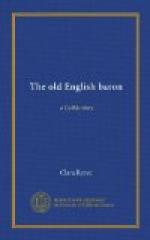In this manner these amiable youths conferred, till they arrived at the castle. The Baron was sitting in the great hall, on a high chair with a footstep before, with the state and dignity of a judge; before him stood Father Oswald, as pleading the cause for himself and Edmund. Round the Baron’s chair stood his eldest son and his kinsmen, with their principal domestics. The old servant, Joseph, at some distance, with his head leaning forward, as listening with the utmost attention to what passed. Mr. William approached the chair. “My Lord, I have found Edmund, and brought him to answer for himself.”
“You have done well,” said the Baron. “Edmund, come hither; you are charged with some indiscretions, for I cannot properly call them crimes: I am resolved to do justice between you and your accusers; I shall therefore hear you as well as them; for no man ought to be condemned unheard.”
“My lord,” said Edmund, with equal modesty and intrepidity, “I demand my trial; if I shall be found guilty of any crimes against my Benefactor, let me be punished with the utmost rigour; But if, as I trust, no such charge can be proved against me, I know your goodness too well to doubt that you will do justice to me, as well as to others; and if it should so happen that by the misrepresentations of my enemies (who have long sought my ruin privately, and now avow it publicly), if by their artifices your lordship should be induced to think me guilty, I would submit to your sentence in silence, and appeal to another tribunal.”
“See,” said Mr. Wenlock, “the confidence of the fellow! he already supposes that my lord must be in the wrong if he condemns him; and then this meek creature will appeal to another tribunal. To whose will he appeal? I desire he may be made to explain himself.”
“That I will immediately,” said Edmund, “without being compelled. I only meant to appeal to Heaven that best knows my innocence.”
“’Tis true,” said the Baron, “and no offence to any one; man can only judge by appearances, but Heaven knows the heart; Let every one of you bear this in mind, that you may not bring a false accusation, nor justify yourselves by concealing the truth. Edmund, I am informed that Oswald and you have made very free with me and my family, in some of your conversations; you were heard to censure me for the absurdity of building a new apartment on the west side of the castle, when there was one on the east side uninhabited. Oswald said, that apartment was shut up because it was haunted; that some shocking murder had been committed there; adding many particulars concerning Lord Lovel’s family, such as he could not know the truth of, and, if he had known, was imprudent to reveal. But, further, you complained of ill-treatment here; and mentioned an intention to leave the castle, and seek your fortune elsewhere. I shall examine into all these particulars in turn. At present I desire you, Edmund, to relate all that you can remember of the conversation that passed between you and Oswald in the wood last Monday.”




